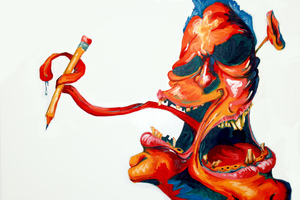
I am lost.
I am in the middle of nowhere, wandering aimlessly, and I am almost out of water. What do I do?
My instinct– Bail. Curl up into a ball and weep for my misfortune. When hiking in the Arizona desert, this is the equivalent of death. But as a writer, I have to admit that for many years, this had always been my instinct. Frustrated, I would crumple up my fourth draft (which was by that point clearly just another garbage attempt at capturing a spattering of fractured thoughts), get a damn glass of water, and abandon the project to the kitchen wastebasket, from whence it could never be salvaged amongst the scraps of food and coffee grounds therein.
My action– Breathe. Now, after eons of practice and self-guided anger management exercises, I have learned to (first) put the pen down calmly and (second) get off the couch to get myself a glass of water. I then (third) put on some music (something that invokes in me the feeling I am striving to attain in my piece) and (fourth) sit down in front of that horrible garbage-draft once again. Maybe I strike-through every word on the page, maybe I don’t. That is not important. But what is important is that I keep on moving, lest I find myself stranded in a desert of my own thoughts, lost and wandering like a child ill-prepared for an adventure of his own design. Prepare yourself to be lost and at least you will never find yourself hopeless.
I keep all of those horrible drafts now. I store them somewhere, usually, out of sight and (mostly) out of mind, but I know they are always there when I need something to get me moving on a story that is struggling to gain traction. Twenty pages of horrible drafting may one day reveal one gem-of-a-line amongst a field of verbal debris, but it may be that one line that saves my story’s (or my main character’s) life, so to speak. Or even better, perhaps that one line becomes the line that injects my story with life for the first time, makes it so my readers can not only feel my prose, they can smell and taste it too– reading that is less like a kitchen sponge, and more like a roasted chicken.
If you find yourself lost in your own story, keep moving. Feel free to wander and do not be afraid of getting too far off the beaten path. The important point is to get the ideas down on paper while you have them– save your frustrations and let them out in red ink during the editing process rather than letting them dominate the writing process altogether.
Always remind yourself (as I often need to do) that you really like– check that– you absolutely love the act of writing. It is the process, the journey you appreciate as much, if not more than the by lines and the finished products themselves. Never forget that many of your favorite writers were never published in their own lifetimes, and many of those that were are long forgotten by history.
So write. Write for you. Write for your life, and always keep crawling forward in your craft. Dwell not in wasted words or on the roughness of your drafts, but rather rejoice in your surroundings once in a while along the way. Stop and take it in every now and then; have a coffee or a cigarette, take a walk or do whatever it is that you do to calm your nerves, and then get back to work.
I mean, when it gets down to it, fighting against that frustration is what makes a good writer great, and as bad as it may seem at any given point, it’s not like it’s gonna kill you.